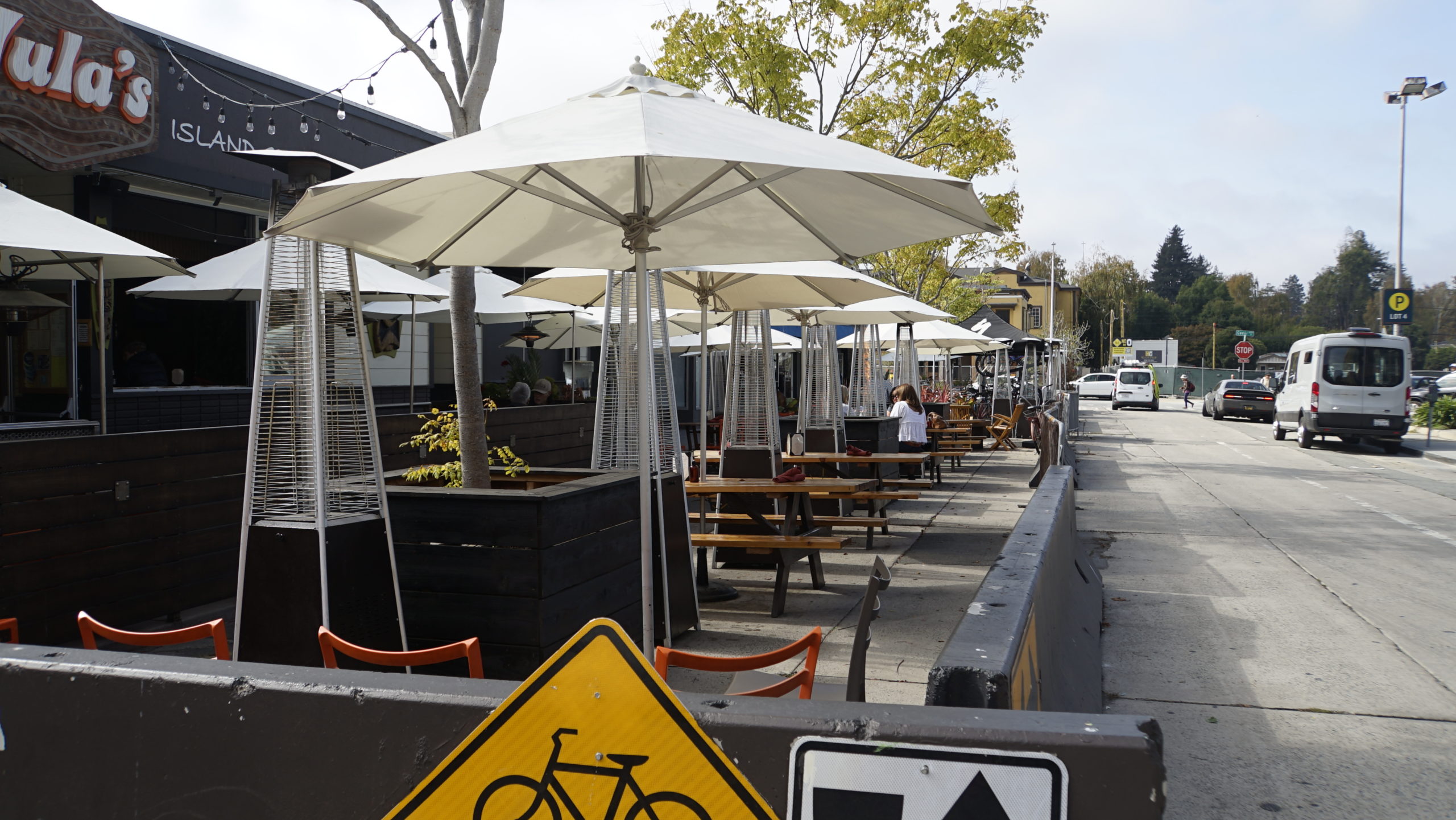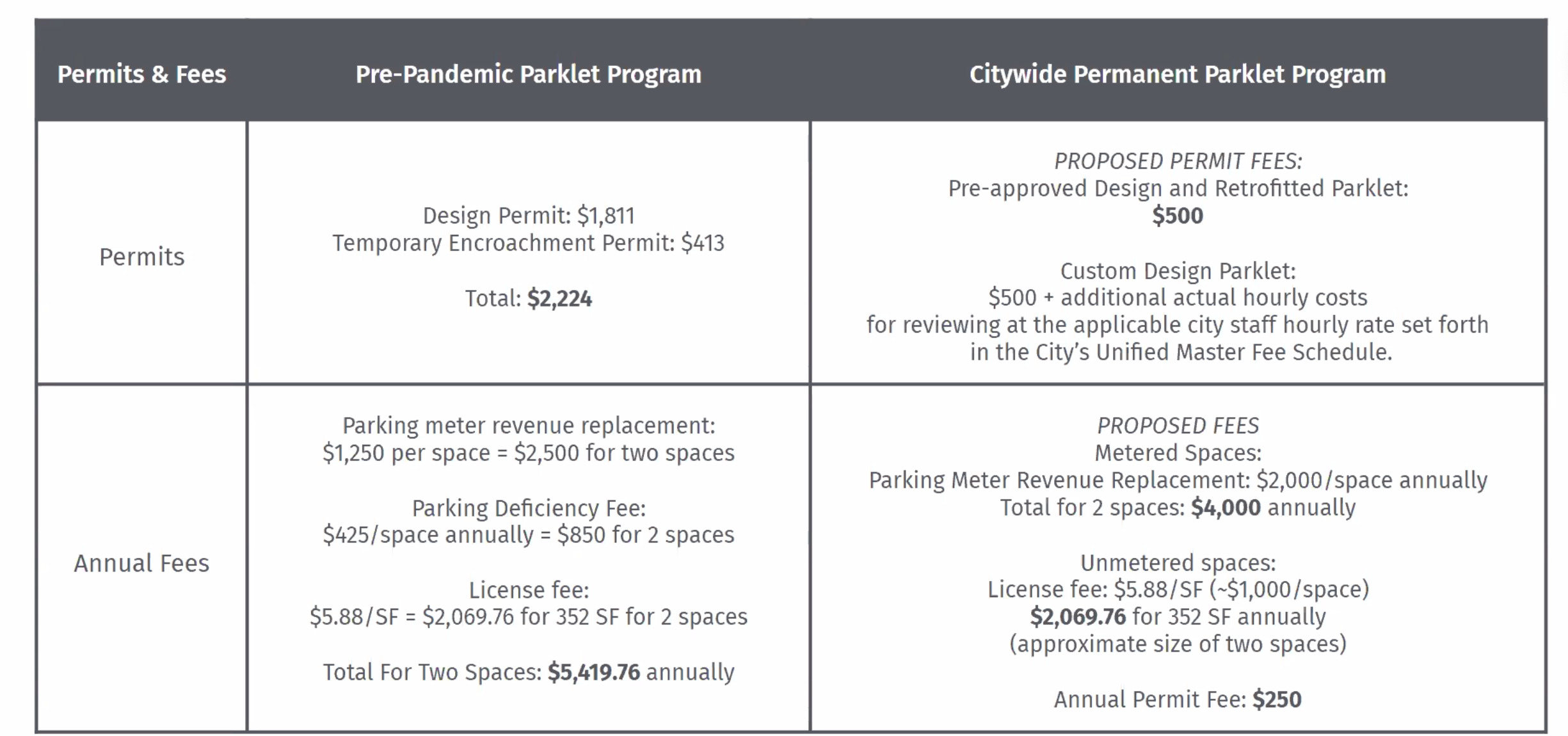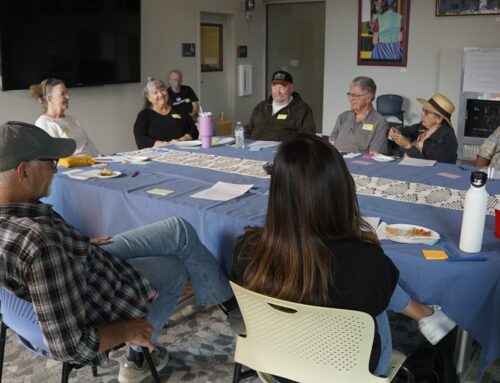
Thirty-five businesses in Santa Cruz, including Hula’s Island Grill on Cathcart Street, have outdoor areas in the city’s temporary “parklet” program. (Kara Meyberg Guzman — Santa Cruz Local file)
SANTA CRUZ >> The Santa Cruz City Council on Tuesday advanced a permanent outdoor dining program with tighter rules on designs and placement in public parking spaces.
The council voted to bring the parklet guidelines and fee schedule to its Nov. 15 council meeting for potential adoption. The council plans to consider rules for outdoor dining on private property early next year.
Santa Cruz first adopted a temporary outdoor dining law in June 2020 to help support flagging businesses in the pandemic. The ordinance has been extended three times. In August 2020, city council directed city staff to start working on a permanent outdoor dining program.
Proposed rules for outdoor restaurant space
Wednesday, Santa Cruz Economic Development Manager Rebecca Unitt presented a draft law that would create a permanent program for parklets in public parking spaces.
- Twenty-six businesses now use 61 parking spaces Downtown.
- In beachside neighborhoods, eight businesses use 47 spaces, including one unmetered space.
- The Westside has one parklet in unmetered spaces.
- Based on a survey last year, city leaders estimated that 28 downtown businesses want to construct a permanent parklet, Unitt said.
The new rules would allow parklets citywide on streets with speed limits of 25 mph or less. Each parklet would need to:
- Occupy a maximum of two parking spaces per parklet, with some exceptions. Parklets can only be used for outdoor dining.
- Close by 11 p.m.
- Not have live entertainment, amplified sound or outdoor food preparation.
- Not have overhead tents or canopies.
- Not be near street corners.
- Not block disabled parking, fire hydrants or vehicle or pedestrian traffic.
- Comply with the accessibility standards of the Americans with Disabilities Act.
The permanent parklets could be a pre-approved design from the city, a retrofitted version of their temporary parklet, or a custom design. An initial version of the pre-approved design would cost $50,000 to $75,000 to build. Because of feedback from some business leaders that those costs were too high, city staff is creating a revised pre-approved design that will cost about $20,000, Unitt said.
City staff is expected to present a program that allows some business leaders to take out a loan for the permanent parklet and have a portion of the loan forgiven each year. The program would only apply to businesses that operate on public parking lots, and it would forgive up to 50% of the loan.
“Businesses will be able to look long term, and in effect turn part of a loan into a grant” said Santa Cruz Economic Development Director Bonnie Lipscomb, at Tuesday’s meeting.
Santa Cruz City Councilmembers Justin Cummings and Renee Golder said they wanted to expand the loan forgiveness program to outdoor dining facilities that operate on private property.
City staff plans to bring the pre-approved designs and loan program to the council at its Nov. 15 meeting. If the parklet law is adopted, applications would open Dec. 15, 2022 to March 31, 2023. After March, unused parklets will be deconstructed, city staff said.
Businesses that operate temporary parklets now will be permitted to keep their temporary outdoor dining in place while their permits are under review and they prepare for construction or retrofit, city staff said. New permanent parklets would be in place by the end of October 2023.
Under the proposed ordinance, businesses with parklets on public parking lots would pay:
- A one-time permit fee of $500. Custom-designed parklets will have to pay additional fees for time spent evaluating the design.
- An annual inspection fee of $250 beginning the second year.
- An annual permit fee of $2,000 per metered parking space or about $1,000 per unmetered parking space.

The new parklet pricing would replace current fees for permits and lost parking revenue. (Santa Cruz Department of Economic Development)
Several business owners at Wednesday’s meeting said they supported the permanent parklet program.
Business leaders react
Alexis Carr, manager at Soif Restaurant, said she was uneasy about the possibility of the parklet design rules changing again in the future. Soif closed its restaurant on Walnut Avenue in January. It operates an adjacent retail wine shop and wine club.
“We’ve all invested so much in parklets already,” Carr said. “It’s kind of scary, to be perfectly frank,” she said.
The council voted to bring the parklet guidelines and fee schedule for adoption at the Nov. 15 council meeting and to coordinate with the Coastal Commission to authorize permanent parklets in the Coastal Zone.
The motion passed 5-2 with Councilmembers Justin Cummings and Sandy Brown opposed. “While I’m supportive of his having this kind of ordinance, I think that it would be in the best interest of the community,” said Cummings. “I know that a lot of community members would like to weigh in on this more before we take action.”
A separate motion to form a subcommittee to gather more feedback from business owners about the parklet program passed unanimously.
The council also voted unanimously to develop a permit for permanent outdoor dining on private property for council consideration in early 2023. Current rules on outdoor dining on private property will extend through Mar. 31, 2024.
Cathcart Street to reopen to two-way traffic
The Santa Cruz City Council on Wednesday also voted unanimously to reopen Cathcart Street to two-way traffic on March 31, 2023.
In 2020, the council authorized a closure of the eastbound lane of Cathcart Street from Cedar Street to Pacific Avenue for outdoor dining. But the closure could limit the fire department’s ability to respond to emergencies downtown, said Deputy Fire Marshal Tim Shields.
“When the COVID pandemic happened, we made a lot of concessions in terms of safety to allow these parklets to happen,” said Shields. “But at some point, we’re gonna have to draw the hard line and open this road up.”
Ian McRae, owner of Hula’s Island Grill, said the closure will remove 56 seats from his restaurant’s outdoor dining capacity. “If we lose 56 seats, there’s just, there’s no way we can continue without laying people off,” McRae said. He asked the council to leave the street one way for two years so he could look at other outdoor dining options.
Questions or comments? Email [email protected]. Learn more about Santa Cruz Local and how we are funded. Santa Cruz Local is supported by members, major donors, sponsors and grants for the general support of our newsroom. Our news judgments are made independently and not on the basis of donor support.
Santa Cruz Local’s news is free. We believe that high-quality local news is crucial to democracy. We depend on locals like you to make a meaningful contribution so everyone can access our news. Learn about membership.
Jesse Kathan is a staff reporter for Santa Cruz Local through the California Local News Fellowship. They hold a master's degree in science communications from UC Santa Cruz.





